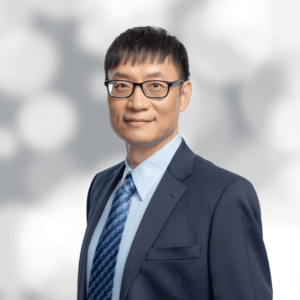Believe in Science: Zhiwei Wang on Working at BeiGene
What has your experience been with our company culture?
I am so lucky that I joined BeiGene when it was founded by John and Xiaodong 12 years ago. Although BeiGene at that time was a small and little-known startup company, I was attracted by the two founders’ vision: creating impactful medicines that will be affordable and accessible to far more cancer patients around the world.
In those early days, all research leadership team members shared the same view, that innovative drug discovery is not easy; however, we as BeiGeners must do something different to create value more efficiently. The team worked very closely, and in addition to formal meetings, many decisions were made even when the team had lunch together. The decision-making process was very transparent and efficient.
From day one, the BeiGene research team never stopped working on potentially best-in-class or first-in-class programs, even though we encountered many hurdles. The team was always searching for the next solution or path forward, even if we did not have enough resources or internal expertise, because if we just looked for excuses and didn’t do anything, there would be no progress.
I still remember that John once told me, ‘Don’t be afraid of making decisions.’ A wrong decision is often better than no decision, because we at least know which path did not work. This is so true in drug discovery. I strongly believe that BeiGene’s values – Patients First, Bold Ingenuity, Driving Excellence, and Collaborative Spirit – continue to motivate our team members.

Can you tell us about your team?
Our Chemistry organization includes two large functions: Chemistry Research and Small Molecule Chemistry, Manufacturing, and Control (CMC). The Medicinal Chemistry team, along with other research teams, focuses on the delivery of preclinical candidates (PCCs), while the CMC team focuses on investigational new drugs (INDs) and beyond.
When a PCC is about to be nominated, a project team will form, including members from CMC and other functions such as Regulatory, Quality, Manufacturing, and Supply Chain. The drug discovery process requires close collaboration among multiple functions, and the Chemistry team shares a common goal with other teams and strives for higher efficiency and higher productivity. What I am most proud of is the can-do attitude of our Chemistry team.
The Chemistry team is always the largest in research at BeiGene. In fast-growing periods, when there is a new business task emerging, it is relatively easy to find a few chemists who can support the urgent need without a huge impact on the team itself.
Though many cases are temporary, some chemists become permanent members in new business units, and you may find them in other functions, such as Environmental Health & Safety (EHS), Quality Assurance/Quality Control (QA/QC), Supply Chain, Regulatory, and even IT.
From 2015 to 2021, I, a medicinal chemist, led an effort to establish the BeiGene Suzhou site with commercial manufacturing capabilities. Our Chemistry team believes it is better to act than to look for excuses, even if the actions are not perfect. Trial and error are still the most useful measures in drug discovery. The whole process requires multiple teams, so collaboration should be a routine practice at work.
What are your biggest accomplishments at BeiGene?
With support from the research leadership team, I and other senior leaders set up BeiGene’s Chemistry organization. Currently there are more than 300 colleagues on the Chemistry team, including 67 PhDs, and many of them have experience in multinational corporations.
Every sub-function shares common goals and has a result-oriented mindset. That enables high efficiency, which is shown in the track record of small-molecule projects:
- About 20 PCCs nominated
- 10 clinical assets delivered
- Two commercial-stage assets, including the BTK inhibitor BRUKINSA (zanubrutinib), which is approved in more than 60 markets
- More than 75 patents filed
- More than 53,000 compounds delivered and registered in database
- Expanding Changping research center to ~40,000 square meters
- Becoming a first-tier team in the industry
How have you grown professionally while on our team?
From a drug discovery perspective, it is said that the best way to learn is to lead a project by yourself. I am so grateful that I had opportunities to lead many projects, including potentially best-in-class and first-in-class. The BTK project started in June 2012, when ibrutinib, a first-generation BTKi, was in Phase 3 clinical trials. Disclosed data then showed that ibrutinib was a game-changing drug candidate for B-cell lymphoma.
Would we still have a chance to make a better BTKi? Many people in the industry thought the chance was low. However, the BeiGene team believed that the selective profile and drug metabolism/pharmacokinetics properties of ibrutinib were not optimal based on its data. So the team decided to move the BTK project forward. Otherwise, we would have missed the opportunity to create our BTKi, BRUKINSA.
Believe in science, believe in data, be resilient, and don’t give up when you encounter challenges, even if the result in the end is not what you expected, and you will grow and become stronger.
Why did you choose to work at BeiGene?
When I first heard that John and Xiaodong wanted to build a new biotech company to provide high-quality medicines for patients around the world, I was inspired by their vision. Many members of the research management team were my former colleagues, and I knew they were willing to devote themselves to innovative drug discovery. Not only are they talented, but they also work with passion. I was also looking for a new opportunity that could provide a platform for serious drug hunters without worrying too much about hierarchical or tedious procedures.
In a nutshell, I choose to work at BeiGene because I am inspired by the founders’ vision; attracted by talented team members; and interested in the platform, which fits my career development path.





